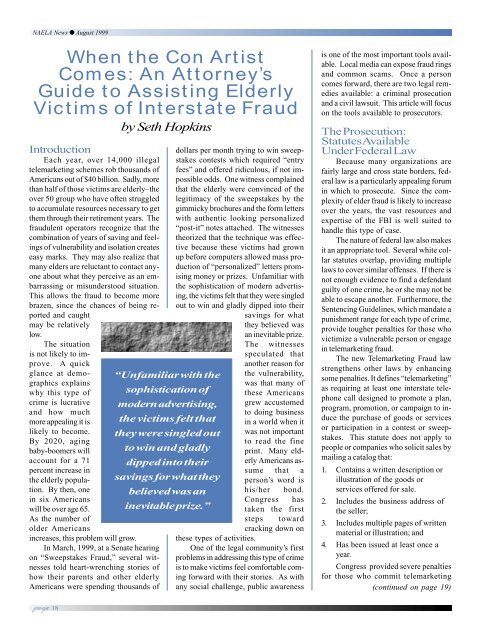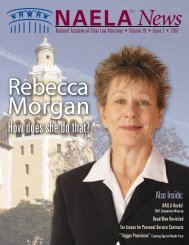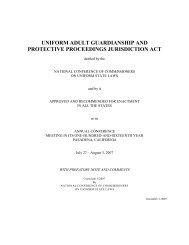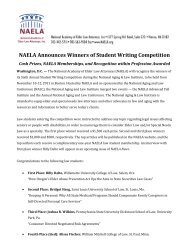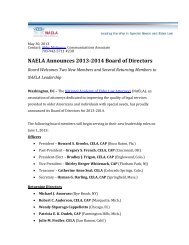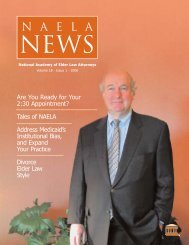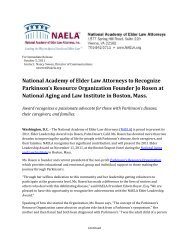NAELA News August, 1999 - National Academy of Elder Law ...
NAELA News August, 1999 - National Academy of Elder Law ...
NAELA News August, 1999 - National Academy of Elder Law ...
Create successful ePaper yourself
Turn your PDF publications into a flip-book with our unique Google optimized e-Paper software.
<strong>NAELA</strong> <strong>News</strong> ● <strong>August</strong> <strong>1999</strong><br />
When the Con Artist<br />
Comes: An Attorney’s<br />
Guide to Assisting <strong>Elder</strong>ly<br />
Victims <strong>of</strong> Interstate Fraud<br />
by Seth Hopkins<br />
Introduction<br />
Each year, over 14,000 illegal<br />
telemarketing schemes rob thousands <strong>of</strong><br />
Americans out <strong>of</strong> $40 billion. Sadly, more<br />
than half <strong>of</strong> those victims are elderly–the<br />
over 50 group who have <strong>of</strong>ten struggled<br />
to accumulate resources necessary to get<br />
them through their retirement years. The<br />
fraudulent operators recognize that the<br />
combination <strong>of</strong> years <strong>of</strong> saving and feelings<br />
<strong>of</strong> vulnerability and isolation creates<br />
easy marks. They may also realize that<br />
many elders are reluctant to contact anyone<br />
about what they perceive as an embarrassing<br />
or misunderstood situation.<br />
This allows the fraud to become more<br />
brazen, since the chances <strong>of</strong> being reported<br />
and caught<br />
may be relatively<br />
low.<br />
The situation<br />
is not likely to improve.<br />
A quick<br />
glance at demographics<br />
explains<br />
why this type <strong>of</strong><br />
crime is lucrative<br />
and how much<br />
more appealing it is<br />
likely to become.<br />
By 2020, aging<br />
baby-boomers will<br />
account for a 71<br />
percent increase in<br />
the elderly population.<br />
By then, one<br />
in six Americans<br />
will be over age 65.<br />
As the number <strong>of</strong><br />
older Americans<br />
increases, this problem will grow.<br />
In March, <strong>1999</strong>, at a Senate hearing<br />
on “Sweepstakes Fraud,” several witnesses<br />
told heart-wrenching stories <strong>of</strong><br />
how their parents and other elderly<br />
Americans were spending thousands <strong>of</strong><br />
“Unfamiliar with the<br />
sophistication <strong>of</strong><br />
modern advertising,<br />
the victims felt that<br />
they were singled out<br />
to win and gladly<br />
dipped into their<br />
savings for what they<br />
believed was an<br />
inevitable prize.”<br />
dollars per month trying to win sweepstakes<br />
contests which required “entry<br />
fees” and <strong>of</strong>fered ridiculous, if not impossible<br />
odds. One witness complained<br />
that the elderly were convinced <strong>of</strong> the<br />
legitimacy <strong>of</strong> the sweepstakes by the<br />
gimmicky brochures and the form letters<br />
with authentic looking personalized<br />
“post-it” notes attached. The witnesses<br />
theorized that the technique was effective<br />
because these victims had grown<br />
up before computers allowed mass production<br />
<strong>of</strong> “personalized” letters promising<br />
money or prizes. Unfamiliar with<br />
the sophistication <strong>of</strong> modern advertising,<br />
the victims felt that they were singled<br />
out to win and gladly dipped into their<br />
savings for what<br />
they believed was<br />
an inevitable prize.<br />
The witnesses<br />
speculated that<br />
another reason for<br />
the vulnerability,<br />
was that many <strong>of</strong><br />
these Americans<br />
grew accustomed<br />
to doing business<br />
in a world when it<br />
was not important<br />
to read the fine<br />
print. Many elderly<br />
Americans assume<br />
that a<br />
person’s word is<br />
his/her bond.<br />
Congress has<br />
taken the first<br />
steps toward<br />
cracking down on<br />
these types <strong>of</strong> activities.<br />
One <strong>of</strong> the legal community’s first<br />
problems in addressing this type <strong>of</strong> crime<br />
is to make victims feel comfortable coming<br />
forward with their stories. As with<br />
any social challenge, public awareness<br />
is one <strong>of</strong> the most important tools available.<br />
Local media can expose fraud rings<br />
and common scams. Once a person<br />
comes forward, there are two legal remedies<br />
available: a criminal prosecution<br />
and a civil lawsuit. This article will focus<br />
on the tools available to prosecutors.<br />
The Prosecution:<br />
Statutes Available<br />
Under Federal <strong>Law</strong><br />
Because many organizations are<br />
fairly large and cross state borders, federal<br />
law is a particularly appealing forum<br />
in which to prosecute. Since the complexity<br />
<strong>of</strong> elder fraud is likely to increase<br />
over the years, the vast resources and<br />
expertise <strong>of</strong> the FBI is well suited to<br />
handle this type <strong>of</strong> case.<br />
The nature <strong>of</strong> federal law also makes<br />
it an appropriate tool. Several white collar<br />
statutes overlap, providing multiple<br />
laws to cover similar <strong>of</strong>fenses. If there is<br />
not enough evidence to find a defendant<br />
guilty <strong>of</strong> one crime, he or she may not be<br />
able to escape another. Furthermore, the<br />
Sentencing Guidelines, which mandate a<br />
punishment range for each type <strong>of</strong> crime,<br />
provide tougher penalties for those who<br />
victimize a vulnerable person or engage<br />
in telemarketing fraud.<br />
The new Telemarketing Fraud law<br />
strengthens other laws by enhancing<br />
some penalties. It defines “telemarketing”<br />
as requiring at least one interstate telephone<br />
call designed to promote a plan,<br />
program, promotion, or campaign to induce<br />
the purchase <strong>of</strong> goods or services<br />
or participation in a contest or sweepstakes.<br />
This statute does not apply to<br />
people or companies who solicit sales by<br />
mailing a catalog that:<br />
1. Contains a written description or<br />
illustration <strong>of</strong> the goods or<br />
services <strong>of</strong>fered for sale.<br />
2. Includes the business address <strong>of</strong><br />
the seller;<br />
3. Includes multiple pages <strong>of</strong> written<br />
material or illustration; and<br />
4. Has been issued at least once a<br />
year.<br />
Congress provided severe penalties<br />
for those who commit telemarketing<br />
(continued on page 19)<br />
18


